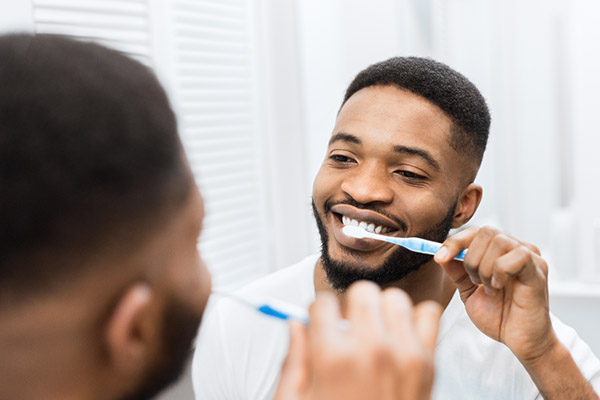 Practicing good oral hygiene basics is essential for keeping beautiful, strong teeth and gums as well as staying healthy throughout the entire body. Here are four of the most common ways to ensure excellent oral health and hygiene.
Practicing good oral hygiene basics is essential for keeping beautiful, strong teeth and gums as well as staying healthy throughout the entire body. Here are four of the most common ways to ensure excellent oral health and hygiene.
Standard oral hygiene practices
1. Brushing and flossing regularly
Dentists recommend that everyone brush their teeth at least two times per day for two minutes each session. Brushing removes food particles left behind after eating and removes plaque, a sticky substance that can accumulate, harden, and lead to gum disease if not taken care of promptly. Manual or electric toothbrushes with soft bristles are the ideal tools for brushing, along with toothpaste containing fluoride. Proper brushing techniques include:
- Holding the toothbrush at a 45-degree angle to your gums
- Moving the brush back and forth in gentle, fluid strokes
- Brushing the outer surface of the teeth while applying mild pressure and then going back to do the same for the backsides of the teeth
People should floss once per day, slowly and carefully as not to agitate the gums. Flossing gets rid of food and plaque between the teeth in places people cannot reach by brushing. Floss comes in varying textures and thicknesses, so find the one that works well for you.
2. Hydrating
Practicing good oral hygiene can be as simple as drinking enough water throughout the day. Water not only washes away food particles left behind from snacks and meals but promotes the production of saliva. The presence of saliva in the mouth helps protect the teeth from issues such as cavities and infections. People should try to drink eight, 8-ounce glasses of water each day for good oral and overall health. While generally not as beneficial as water, drinking hot or iced herbal teas can be similarly helpful for oral health.
3. Visiting the dentist regularly
The excellent preventative practice of oral hygiene is to visit the dentist every six months for a checkup and cleaning. A dental exam includes checking for cavities, gum disease, and other oral problems before they turn into something more serious. Everyone should also get x-rays of their teeth every two to three years, even if their teeth are otherwise healthy, to identify any possible issues that cannot be seen on the surface of the teeth. If desired, someone can choose to have their teeth whitened at the dentist for purely cosmetic reasons.
4. Reducing intake of acidic and sugary foods
Sugar helps feed the bacteria that live in your mouth and contributes to plaque forming on the surfaces of the teeth. Reducing sugar intake helps maintain a healthy oral environment. Acidic foods and drinks can eventually lead to erosion of the enamel of the teeth when consumed in large amounts over time. Drinking water and brushing can reduce some of the adverse effects of sugar and acid, but it is advisable to avoid these substances in the first place.
Conclusion
Practicing these simple oral hygiene basics can prevent serious issues with oral health.
Request an appointment or call Family Choice Dental at 505-634-5657 for an appointment in our Albuquerque office.
Related Posts
There are several options available to patients after losing a tooth. One of the more popular options -- and perhaps the longest-lasting solution – is implant dentistry. This involves the placement of one or more dental implants, followed by the attachment of abutments and a crown, bridge, or denture.Depending on the number of teeth that…
Implant dentistry offers a tooth replacement solution that looks and feels natural. This is due in large part to the implant, which fuses together with the jawbone and serves as the support and root of the replacement tooth. This review discusses the unique benefits of choosing implant dentistry to replace a missing tooth.The most notable…
Implant dentistry includes the entire treatment implant process, from the consultation visit to providing aftercare and educational services to ensure the implants remain in good condition. The following review discusses how you can get the most out of your dental implants through good aftercare practices.You can care for your dental implant restoration by implementing a…
